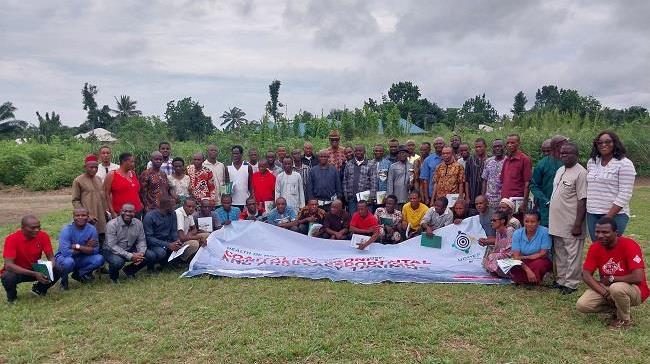Communities in the Niger Delta region in Nigeria are vulnerable because of the impact from the exploration and exploitation of oil companies. Communities where oil and gas activities are carried out have continued to bear the costs of the negative impact of these activities and the oil and gas companies have continued to replicate these actions in various communities in the region.

Health of Mother Earth Foundation (HOMEF) in its capacity to continue in the fight against environmental pollution brought together community members from K-Dere, Kpor, Goi and Mogho communities for a learning and sharing session on the usefulness of community monitoring, organising and advocacy.
Director of HOMEF, Nnimmo Bassey, during his address to the community, people stressed the need to protect the environment.
He stated that although oil has not been drilled in Ogoniland since 1993, oil still passes through the territory, and it remains one of the most polluted areas in the Niger Delta. He further stressed the need for solidarity and the need to rebuild their livelihoods.
“The Niger Delta region has been bastardised, yet these companies are attempting to divest and sell off their assets to indigenous companies without cleaning and remediating the environment and compensating the people for decades of rapacious exploitation. This learning session aims to empower community members to be ready to hold environmental destroyers accountable for the damages done,” Bassey stated.
K-Dere community with about 54 oil wells had a major oil spill which occurred on April 12, 2009, when the fire from the Bomu Manifold burned and spread to the neighbouring Goi and Mogho communities, causing damages that destroyed people’s livelihoods. Between 2007 and 2014, it was reported that 352,000 barrels of crude oil were spilled from the Bomu Manifold, a Shell facility.
Some community members shared their experiences on what they suffer from the destroyed environment and loss of livelihoods.
Julia Gaage, a 62-year-old farmer from K-Dere, lamented the damages on the land from pollution.
“We are forced to plant yams using fertiliser because of the damage done to our land by oil pollution. We know that fertiliser is not so good for our soil, but it is the only way we can make things grow in our circumstances. Before now we did not use fertiliser but today if you do not add these things, you will not have a good yield and there will be nothing to live or feed on,” she said.
Chief Godwin from Goi told stories of how favourable the environment to them in the past.
His words: “I saw my parents harvesting tubers of yam that required the help of three people to pull out of the ground. But now, you can’t even find grasses anymore. Oil has taken away our livelihoods. We cannot fish or farm successfully anymore. You cannot find crabs or small fishes anymore. The air in Goi community is even hostile to the people. No hospital, road, or even clean water. We are scared for our lives.”
HOMEF’s Stephen Oduware, a Project Lead on Networking and Alliances, charged community members to learn to task our political leaders who approach them for votes to begin to take issues of environmental pollution seriously.
“We should learn to hold them accountable when things are not going the right way and demand that they should come up with policies that will elevate the sufferings of the people,” Oduware said, even as he tasked the people to regularly monitor the environment and note the changes that occur.
HOMEF works with communities to help them seek environmental justice with the power of knowledge. The participants that took part in the exercise thanked HOMEF for enhancing their capacity to identify and report on environmental, social-economic challenges that affect their wellbeing.
Units of FishNet Alliance – a continental network of fishers against harmful activities – were inaugurated during the gathering.
